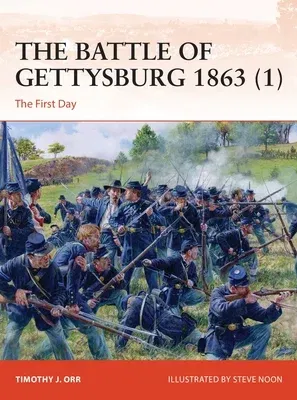This first volume of three discusses the tactical decisions made on
day one and the ensuing combat, while also including a brief summary of
the grand strategy in the Eastern Theater of the war, the conduct of the
Pennsylvania Campaign from June 6 to 30, 1863, and the plight of
civilians caught up in the conflict.
The Battle of Gettysburg, which took place July 1-3, 1863 in and around
the town of Gettysburg, PA resulted in the largest number of casualties
of the entire American Civil War and is seen as the key turning point in
the conflict. On its first day, Confederate General Robert E. Lee's Army
of Northern Virginia sought to destroy the Union army, forcing its men
to retreat through the streets of the town to the hills just to the
south**.** The opening clash involved four divisions of Confederate
infantry and their accompanying artillery battalions, about 27,000
officers and men. They assaulted two corps of Union infantry and an
accompanying division of cavalry, about 22,000 aggregate. Much of the
narrative describes the tactical play-by-play, the customary 'who did
what' of the battle, but it also gives special emphasis to identifying
the critical decisions of July 1 and explains why the commanders
committed to them.
This volume, the first of three to cover the battle in depth, also
emphasizes the experience of combat as witnessed by the rank and
file-the 'face of battle'-to borrow John Keegan's expression. Primary
accounts from common soldiers remind readers that Gettysburg was-first
and foremost-a soldier's battle, full of raw emotion. This superbly
detailed study explores the battle chronologically; but in cases where
several actions occurred simultaneously, the chapters are partitioned
according to key terrain features. Among the action covered is the
morning cavalry skirmish, the morning clash at the Herbst's wood lot and
at the railroad cut, the afternoon clash at Oak Ridge, the afternoon
fight at the Edward McPherson farm, the afternoon rout of the 11th
Corps, the last stand of the 1st Corps at Seminary Ridge, the Union
retreat through town, and the positions of the armies at nightfall.

